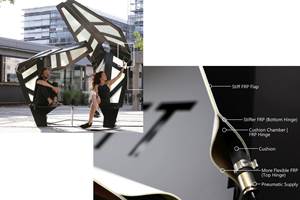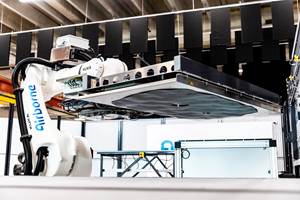Local Motors to use Siemens software for 3-D printed vehicles
The partnership combines Siemens’ PLM software technology with Local Motors’ leadership in co-created and 3-D-printed vehicles – direct digital manufacturing (DDM).
Siemens (Munich, Germany) and Local Motors (Phoenix, AZ, US) have formed a new partnership intended to help advance the future of manufacturing by optimizing the development and large-scale 3-D printing of cars. The partnership combines Siemens’ product lifecycle management (PLM) software technology with Local Motors’ leadership in co-created and 3-D-printed vehicles – direct digital manufacturing (DDM).
Local Motors plans to enhance productivity in its innovative Local Motors (LM) Labs program by leveraging Siemens’ expertise in creating “digital twins,” while Siemens expects to further enhance its digital enterprise software suite to support the latest advances in additive manufacturing and 3-D printing.
“We have been partners with Siemens since 2011, and today’s announcement takes that partnership to the next level by enabling our community of co-creators to innovate even faster,” says Jay Rogers, CEO of Local Motors. “We developed the world’s first co-created vehicle and 3-D-printed car, and now our LM Labs program is providing the world’s makers with a way – both online and offline – to create new technologies to advance the future of transportation. Open to anyone, LM Labs helps brilliant minds create new technologies the world needs. While our primary focus is on developing vehicles, LM Labs is a place where the community can advance any technology.”
Siemens’ Solid Edge CAD application, has been in use at Local Motors for several years and has been crucial in facilitating its co-creation model. Using Siemens’ exclusive synchronous technology, Local Motors is able to import into Solid Edge non-native CAD models from design collaborators around the world, and then use Solid Edge to easily edit these models.
This new partnership expands the use of Solid Edge and adds Siemens’ NX software and its Fibersim portfolio to all Local Motors facilities around the world. NX is a CAD, manufacturing and engineering simulation (CAD/CAM/CAE) solution; Fibersim is a portfolio of software for composites engineering. By expanding its use of Siemens’ digital enterprise software suite, Local Motors and its community of co-creators can leverage digital twins to increase productivity and quality in product design and DDM.
DDM and digital twins save time, reduce costs and increase quality by integrating and streamlining the design and production processes. The DDM process, which takes advantage of additive manufacturing technologies including 3-D printing, produces parts directly from 3-D models. DDM helps eliminate the need for tooling, removes time lag between design and production, and simplifies redesign. Siemens’ digital twin software technology links design and production by enabling the creation of virtual models that accurately represent the form, function and performance of a product and its production system. These high-fidelity digital twins enable engineers to test the functionality of the products and manufacturing processes in the virtual world in order to predict and optimize performance in the physical world.
Local Motors plans to open three new facilities this year, all of which will feature LM Labs. Siemens PLM Software plans to be a sponsor of all three LM Labs. A lab space plus a showroom and demonstration facility is scheduled to open near Washington, D.C. in National Harbor, MD, US, this summer. The National Harbor opening is slated to be followed by the debut of a lab facility in Berlin, Germany, and a full-scale DDM microfactory in Knoxville, TN, US, later this year. The microfactory in Knoxville will serve as the main Local Motors facility for the development and construction of 3-D-printed vehicles.
Related Content
Adaptive composite elements for building facades exhibited at JEC World 2023
University of Stuttgart institutes use carbon and glass fiber composites, robotic fabrication, biomimetic design and digial twin/control to demonstrate adaptive facade elements for future buildings.
Read MoreSAM XL demonstrates closed-loop digital methodologies via full-size aerocomposite parts development
PeneloPe Project’s modular, zero-defect manufacturing deliverables are being highlighted in an upcoming video that demonstrates the resulting aerospace pilot line’s feasibility.
Read MoreModular, robotic cells enable high-rate RTM using any material format
Airborne’s automated ply placement systems at Airbus, GKN Aerospace and Teijin Automotive Technologies aim to maximize flexibility and intelligent automation.
Read MoreAerotech Academy Puglia is inaugurated at Leonardo Aerospace site in Grottaglie, Italy
Joining the Leonardo MaTeRIA Lab and Joint Lab with Syensqo, this aerostructures training course will be 75% materials science and structural design/analysis, 25% digital transformation and AI.
Read MoreRead Next
Plant tour: Daher Shap’in TechCenter and composites production plant, Saint-Aignan-de-Grandlieu, France
Co-located R&D and production advance OOA thermosets, thermoplastics, welding, recycling and digital technologies for faster processing and certification of lighter, more sustainable composites.
Read MoreAll-recycled, needle-punched nonwoven CFRP slashes carbon footprint of Formula 2 seat
Dallara and Tenowo collaborate to produce a race-ready Formula 2 seat using recycled carbon fiber, reducing CO2 emissions by 97.5% compared to virgin materials.
Read MoreDeveloping bonded composite repair for ships, offshore units
Bureau Veritas and industry partners issue guidelines and pave the way for certification via StrengthBond Offshore project.
Read More













.jpg;maxWidth=300;quality=90)











